Media Law Assignment: Analysis of Defamation and Case Studies
VerifiedAdded on 2023/01/12
|11
|2741
|45
Report
AI Summary
This report provides an in-depth analysis of media law, particularly concerning defamation. It examines three distinct cases, each presenting unique legal challenges and ethical considerations. The first case explores a situation where a reporter's critical social media posts about the government potentially violate media law, focusing on defamation and the necessary evidence required for publication. The second case involves the media's responsibility in reporting on a murder, considering the suspect's prior criminal record and the potential for sensationalism versus public interest. The third case analyzes defamation in the context of online reviews, specifically, how a motel's deceptive reviews of a competitor could lead to legal action. Each case includes discussions of relevant laws, possible legal defenses, and case precedents, such as the Rebel Wilson defamation case. The report concludes by outlining the appropriate courses of action for each scenario, emphasizing the importance of adhering to media law and ethical guidelines. The report provides a comprehensive overview of legal issues within the media landscape, including defamation, freedom of expression, and the responsible dissemination of information.
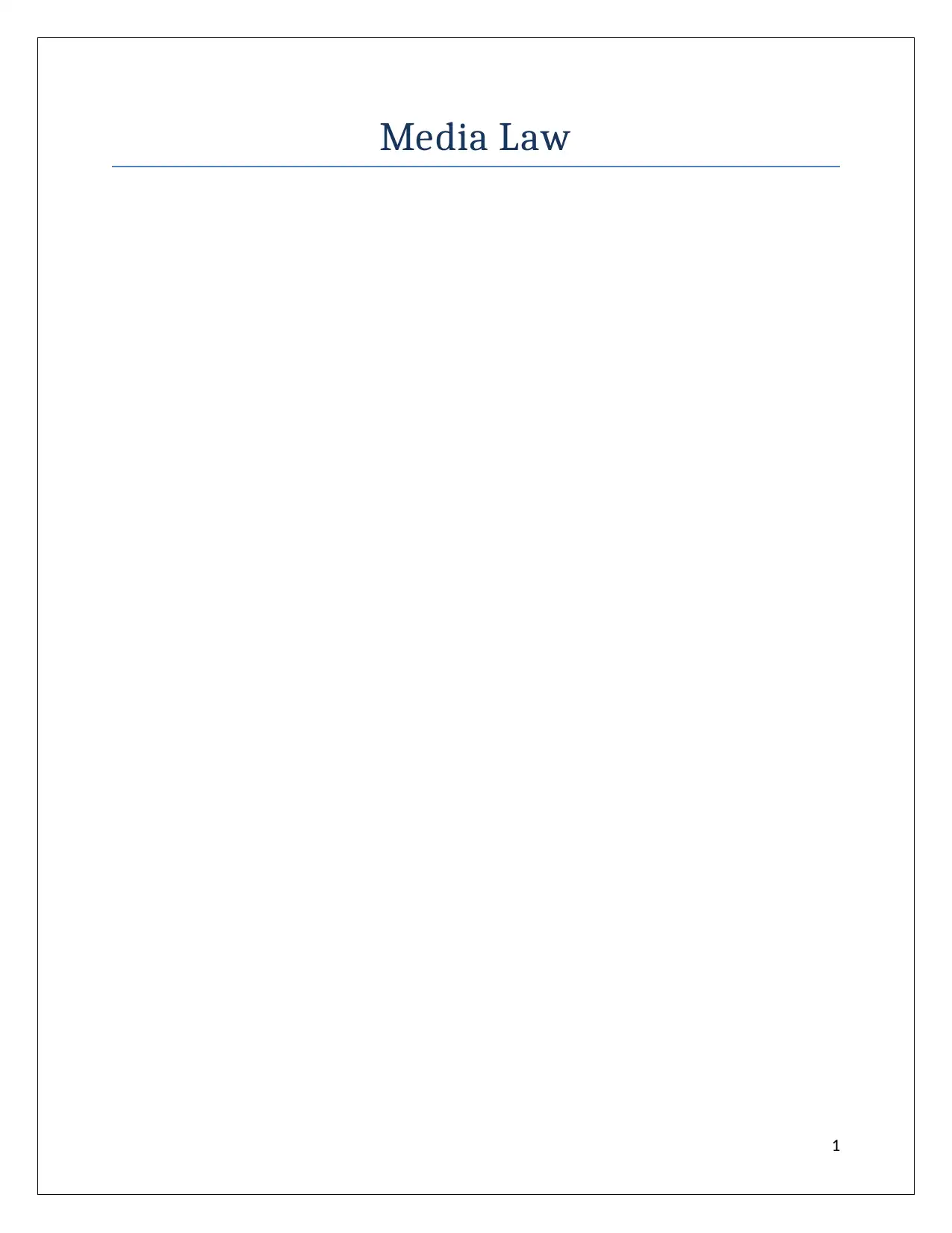
Media Law
1
1
Paraphrase This Document
Need a fresh take? Get an instant paraphrase of this document with our AI Paraphraser
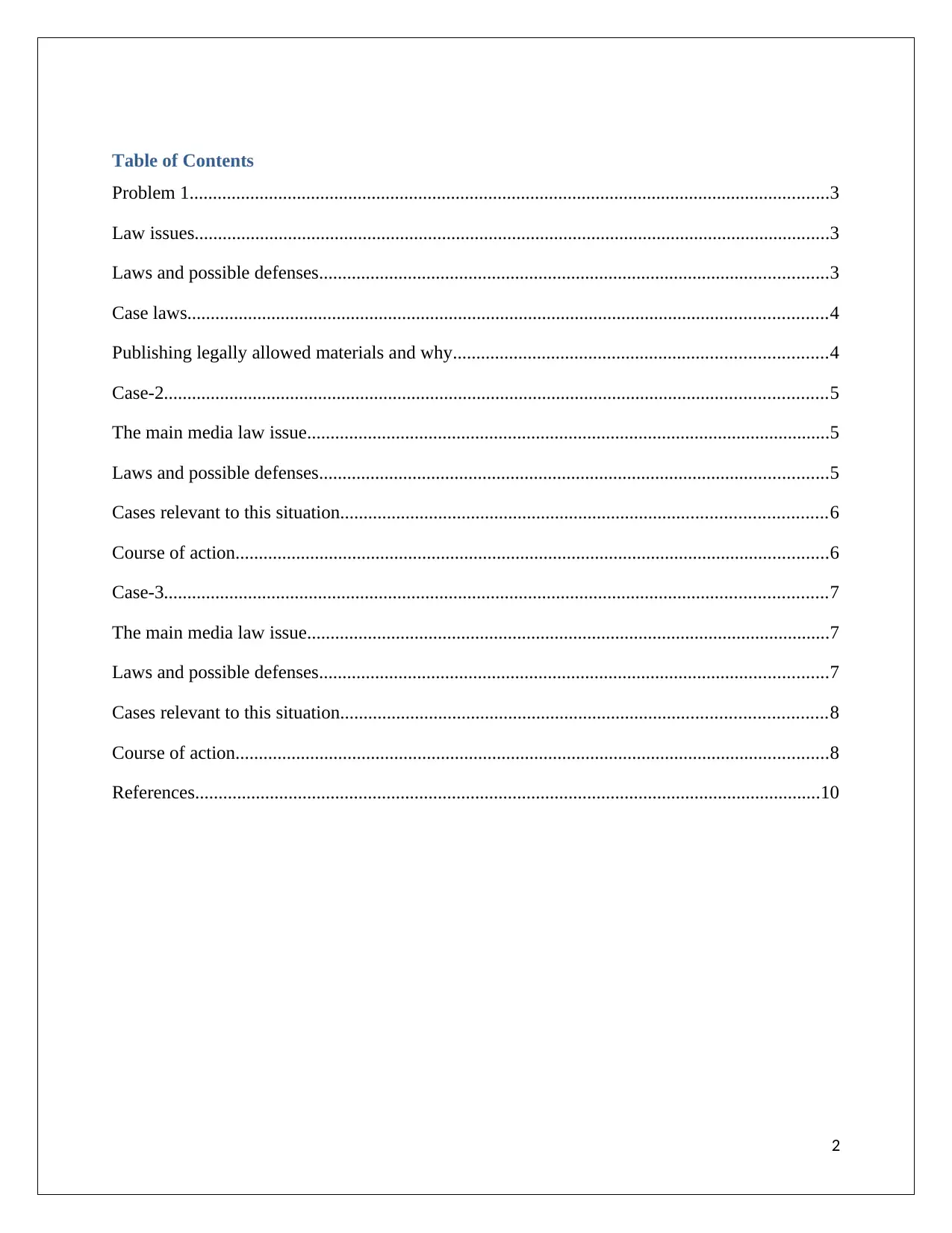
Table of Contents
Problem 1.........................................................................................................................................3
Law issues........................................................................................................................................3
Laws and possible defenses.............................................................................................................3
Case laws.........................................................................................................................................4
Publishing legally allowed materials and why................................................................................4
Case-2..............................................................................................................................................5
The main media law issue................................................................................................................5
Laws and possible defenses.............................................................................................................5
Cases relevant to this situation........................................................................................................6
Course of action...............................................................................................................................6
Case-3..............................................................................................................................................7
The main media law issue................................................................................................................7
Laws and possible defenses.............................................................................................................7
Cases relevant to this situation........................................................................................................8
Course of action...............................................................................................................................8
References......................................................................................................................................10
2
Problem 1.........................................................................................................................................3
Law issues........................................................................................................................................3
Laws and possible defenses.............................................................................................................3
Case laws.........................................................................................................................................4
Publishing legally allowed materials and why................................................................................4
Case-2..............................................................................................................................................5
The main media law issue................................................................................................................5
Laws and possible defenses.............................................................................................................5
Cases relevant to this situation........................................................................................................6
Course of action...............................................................................................................................6
Case-3..............................................................................................................................................7
The main media law issue................................................................................................................7
Laws and possible defenses.............................................................................................................7
Cases relevant to this situation........................................................................................................8
Course of action...............................................................................................................................8
References......................................................................................................................................10
2
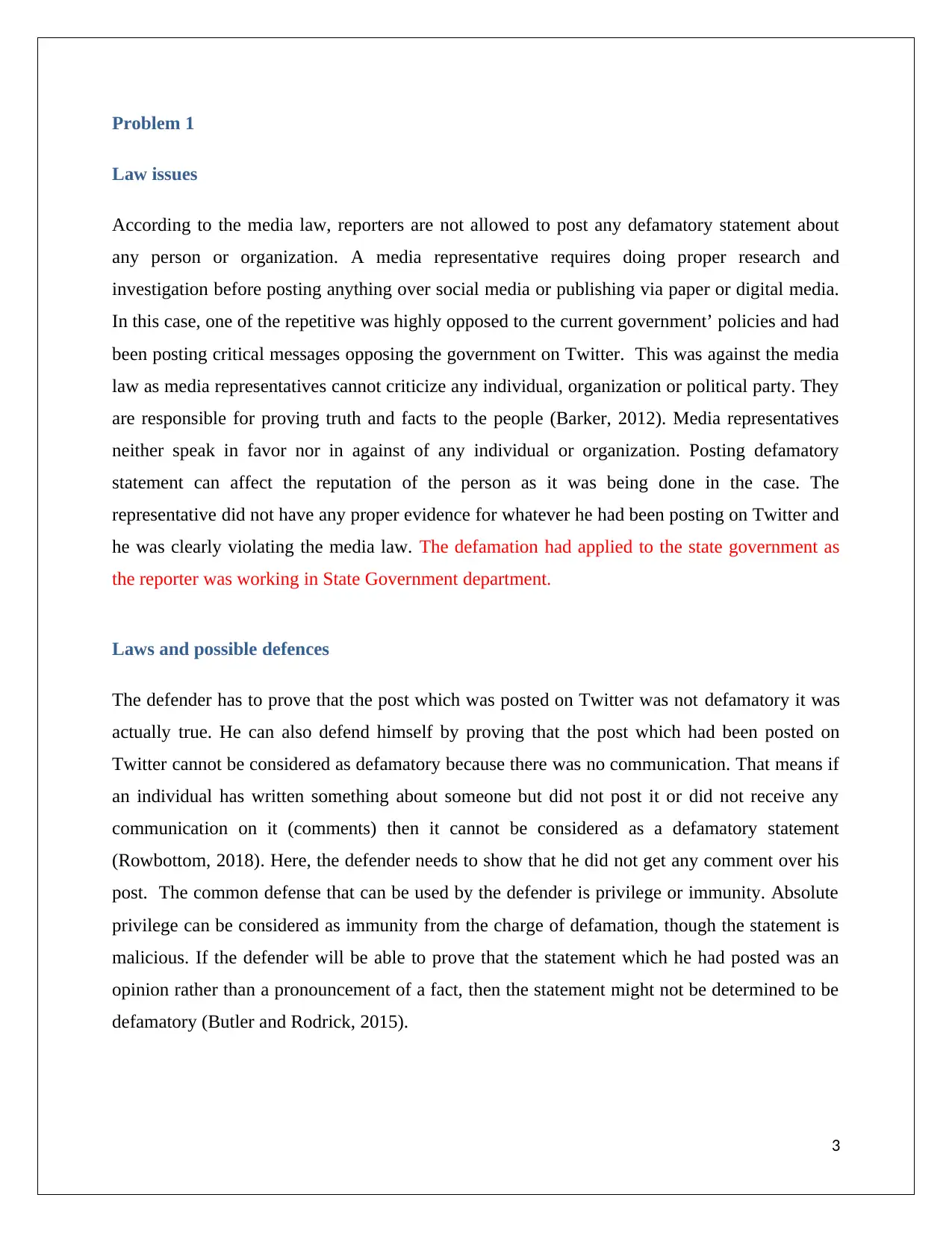
Problem 1
Law issues
According to the media law, reporters are not allowed to post any defamatory statement about
any person or organization. A media representative requires doing proper research and
investigation before posting anything over social media or publishing via paper or digital media.
In this case, one of the repetitive was highly opposed to the current government’ policies and had
been posting critical messages opposing the government on Twitter. This was against the media
law as media representatives cannot criticize any individual, organization or political party. They
are responsible for proving truth and facts to the people (Barker, 2012). Media representatives
neither speak in favor nor in against of any individual or organization. Posting defamatory
statement can affect the reputation of the person as it was being done in the case. The
representative did not have any proper evidence for whatever he had been posting on Twitter and
he was clearly violating the media law. The defamation had applied to the state government as
the reporter was working in State Government department.
Laws and possible defences
The defender has to prove that the post which was posted on Twitter was not defamatory it was
actually true. He can also defend himself by proving that the post which had been posted on
Twitter cannot be considered as defamatory because there was no communication. That means if
an individual has written something about someone but did not post it or did not receive any
communication on it (comments) then it cannot be considered as a defamatory statement
(Rowbottom, 2018). Here, the defender needs to show that he did not get any comment over his
post. The common defense that can be used by the defender is privilege or immunity. Absolute
privilege can be considered as immunity from the charge of defamation, though the statement is
malicious. If the defender will be able to prove that the statement which he had posted was an
opinion rather than a pronouncement of a fact, then the statement might not be determined to be
defamatory (Butler and Rodrick, 2015).
3
Law issues
According to the media law, reporters are not allowed to post any defamatory statement about
any person or organization. A media representative requires doing proper research and
investigation before posting anything over social media or publishing via paper or digital media.
In this case, one of the repetitive was highly opposed to the current government’ policies and had
been posting critical messages opposing the government on Twitter. This was against the media
law as media representatives cannot criticize any individual, organization or political party. They
are responsible for proving truth and facts to the people (Barker, 2012). Media representatives
neither speak in favor nor in against of any individual or organization. Posting defamatory
statement can affect the reputation of the person as it was being done in the case. The
representative did not have any proper evidence for whatever he had been posting on Twitter and
he was clearly violating the media law. The defamation had applied to the state government as
the reporter was working in State Government department.
Laws and possible defences
The defender has to prove that the post which was posted on Twitter was not defamatory it was
actually true. He can also defend himself by proving that the post which had been posted on
Twitter cannot be considered as defamatory because there was no communication. That means if
an individual has written something about someone but did not post it or did not receive any
communication on it (comments) then it cannot be considered as a defamatory statement
(Rowbottom, 2018). Here, the defender needs to show that he did not get any comment over his
post. The common defense that can be used by the defender is privilege or immunity. Absolute
privilege can be considered as immunity from the charge of defamation, though the statement is
malicious. If the defender will be able to prove that the statement which he had posted was an
opinion rather than a pronouncement of a fact, then the statement might not be determined to be
defamatory (Butler and Rodrick, 2015).
3
⊘ This is a preview!⊘
Do you want full access?
Subscribe today to unlock all pages.

Trusted by 1+ million students worldwide
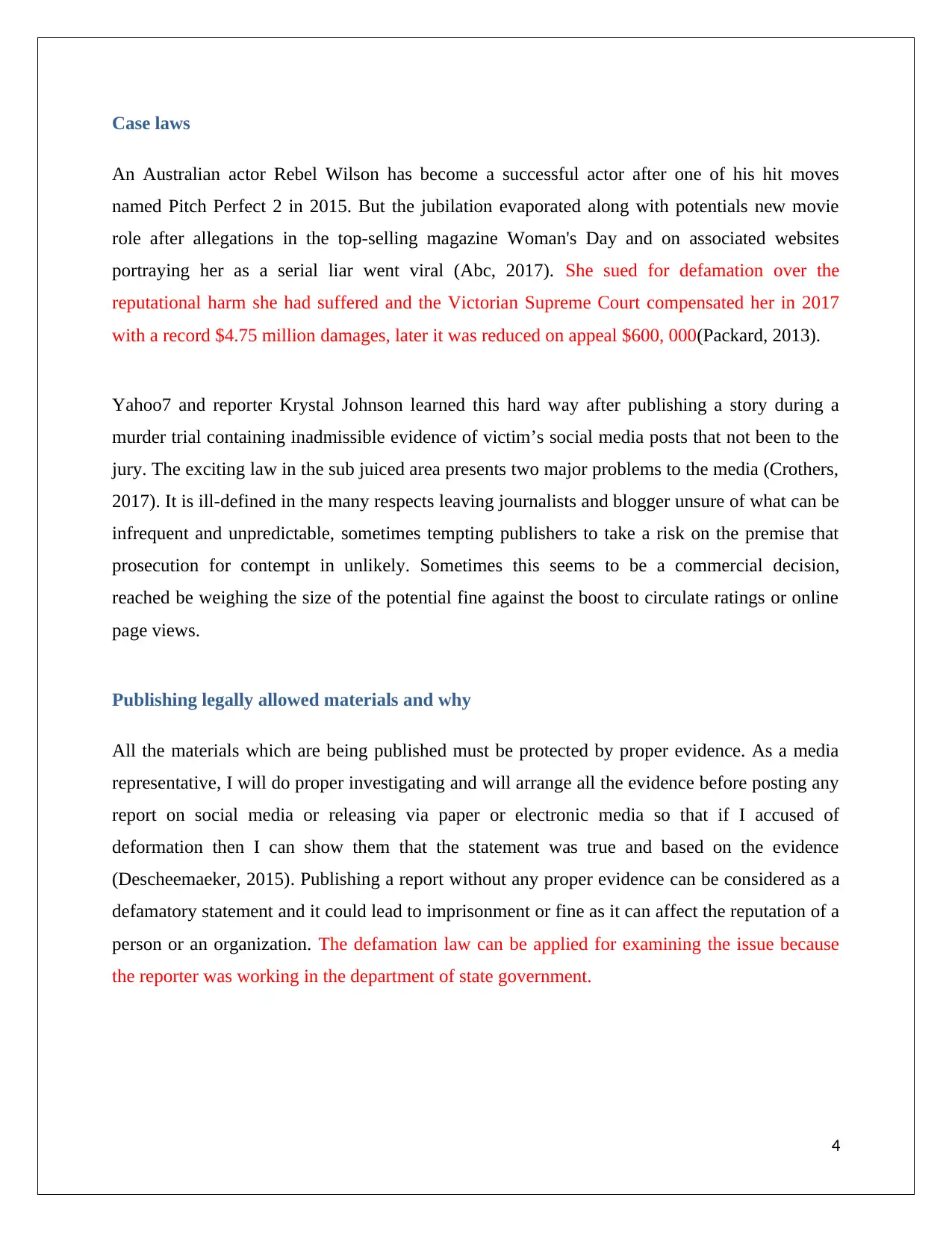
Case laws
An Australian actor Rebel Wilson has become a successful actor after one of his hit moves
named Pitch Perfect 2 in 2015. But the jubilation evaporated along with potentials new movie
role after allegations in the top-selling magazine Woman's Day and on associated websites
portraying her as a serial liar went viral (Abc, 2017). She sued for defamation over the
reputational harm she had suffered and the Victorian Supreme Court compensated her in 2017
with a record $4.75 million damages, later it was reduced on appeal $600, 000(Packard, 2013).
Yahoo7 and reporter Krystal Johnson learned this hard way after publishing a story during a
murder trial containing inadmissible evidence of victim’s social media posts that not been to the
jury. The exciting law in the sub juiced area presents two major problems to the media (Crothers,
2017). It is ill-defined in the many respects leaving journalists and blogger unsure of what can be
infrequent and unpredictable, sometimes tempting publishers to take a risk on the premise that
prosecution for contempt in unlikely. Sometimes this seems to be a commercial decision,
reached be weighing the size of the potential fine against the boost to circulate ratings or online
page views.
Publishing legally allowed materials and why
All the materials which are being published must be protected by proper evidence. As a media
representative, I will do proper investigating and will arrange all the evidence before posting any
report on social media or releasing via paper or electronic media so that if I accused of
deformation then I can show them that the statement was true and based on the evidence
(Descheemaeker, 2015). Publishing a report without any proper evidence can be considered as a
defamatory statement and it could lead to imprisonment or fine as it can affect the reputation of a
person or an organization. The defamation law can be applied for examining the issue because
the reporter was working in the department of state government.
4
An Australian actor Rebel Wilson has become a successful actor after one of his hit moves
named Pitch Perfect 2 in 2015. But the jubilation evaporated along with potentials new movie
role after allegations in the top-selling magazine Woman's Day and on associated websites
portraying her as a serial liar went viral (Abc, 2017). She sued for defamation over the
reputational harm she had suffered and the Victorian Supreme Court compensated her in 2017
with a record $4.75 million damages, later it was reduced on appeal $600, 000(Packard, 2013).
Yahoo7 and reporter Krystal Johnson learned this hard way after publishing a story during a
murder trial containing inadmissible evidence of victim’s social media posts that not been to the
jury. The exciting law in the sub juiced area presents two major problems to the media (Crothers,
2017). It is ill-defined in the many respects leaving journalists and blogger unsure of what can be
infrequent and unpredictable, sometimes tempting publishers to take a risk on the premise that
prosecution for contempt in unlikely. Sometimes this seems to be a commercial decision,
reached be weighing the size of the potential fine against the boost to circulate ratings or online
page views.
Publishing legally allowed materials and why
All the materials which are being published must be protected by proper evidence. As a media
representative, I will do proper investigating and will arrange all the evidence before posting any
report on social media or releasing via paper or electronic media so that if I accused of
deformation then I can show them that the statement was true and based on the evidence
(Descheemaeker, 2015). Publishing a report without any proper evidence can be considered as a
defamatory statement and it could lead to imprisonment or fine as it can affect the reputation of a
person or an organization. The defamation law can be applied for examining the issue because
the reporter was working in the department of state government.
4
Paraphrase This Document
Need a fresh take? Get an instant paraphrase of this document with our AI Paraphraser
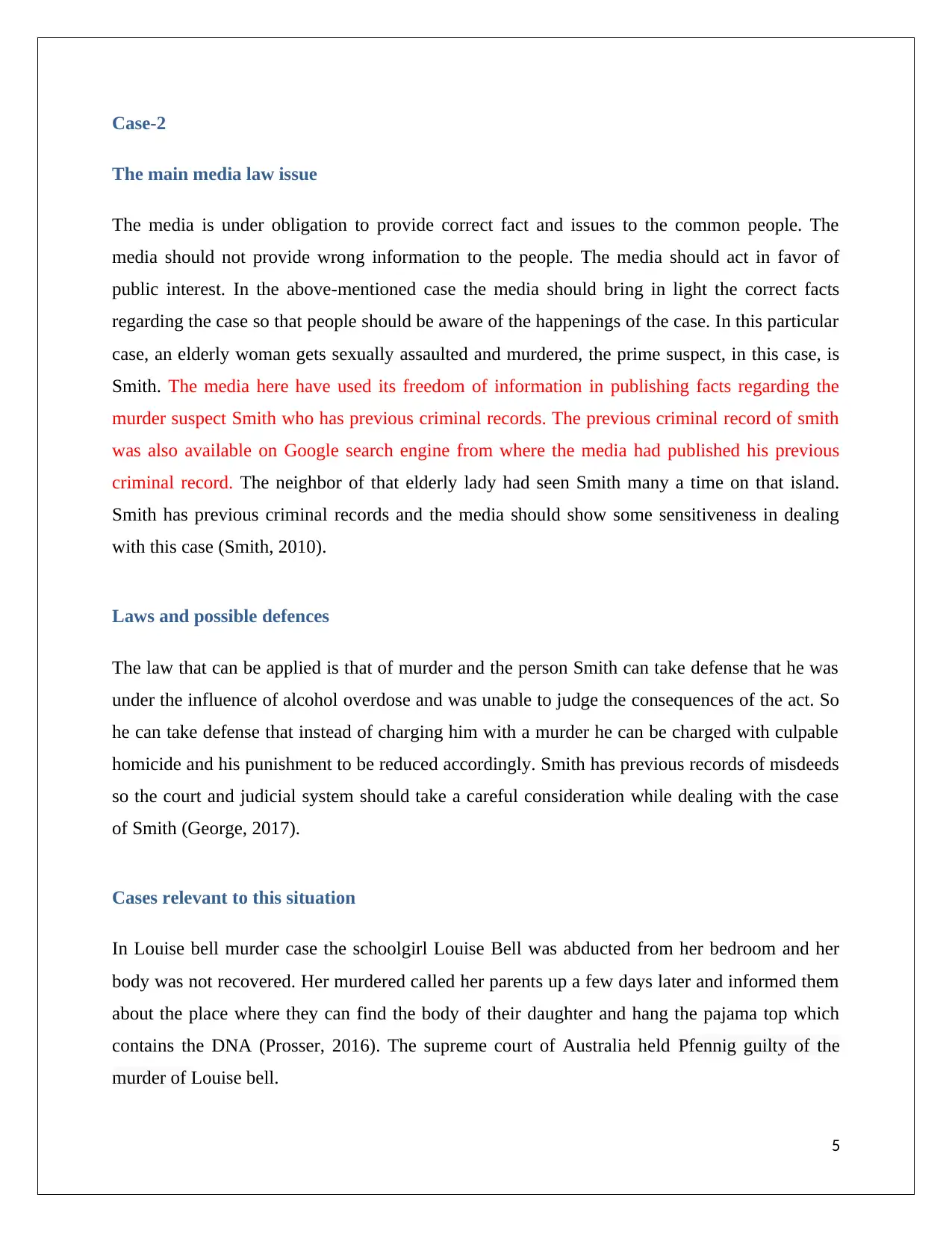
Case-2
The main media law issue
The media is under obligation to provide correct fact and issues to the common people. The
media should not provide wrong information to the people. The media should act in favor of
public interest. In the above-mentioned case the media should bring in light the correct facts
regarding the case so that people should be aware of the happenings of the case. In this particular
case, an elderly woman gets sexually assaulted and murdered, the prime suspect, in this case, is
Smith. The media here have used its freedom of information in publishing facts regarding the
murder suspect Smith who has previous criminal records. The previous criminal record of smith
was also available on Google search engine from where the media had published his previous
criminal record. The neighbor of that elderly lady had seen Smith many a time on that island.
Smith has previous criminal records and the media should show some sensitiveness in dealing
with this case (Smith, 2010).
Laws and possible defences
The law that can be applied is that of murder and the person Smith can take defense that he was
under the influence of alcohol overdose and was unable to judge the consequences of the act. So
he can take defense that instead of charging him with a murder he can be charged with culpable
homicide and his punishment to be reduced accordingly. Smith has previous records of misdeeds
so the court and judicial system should take a careful consideration while dealing with the case
of Smith (George, 2017).
Cases relevant to this situation
In Louise bell murder case the schoolgirl Louise Bell was abducted from her bedroom and her
body was not recovered. Her murdered called her parents up a few days later and informed them
about the place where they can find the body of their daughter and hang the pajama top which
contains the DNA (Prosser, 2016). The supreme court of Australia held Pfennig guilty of the
murder of Louise bell.
5
The main media law issue
The media is under obligation to provide correct fact and issues to the common people. The
media should not provide wrong information to the people. The media should act in favor of
public interest. In the above-mentioned case the media should bring in light the correct facts
regarding the case so that people should be aware of the happenings of the case. In this particular
case, an elderly woman gets sexually assaulted and murdered, the prime suspect, in this case, is
Smith. The media here have used its freedom of information in publishing facts regarding the
murder suspect Smith who has previous criminal records. The previous criminal record of smith
was also available on Google search engine from where the media had published his previous
criminal record. The neighbor of that elderly lady had seen Smith many a time on that island.
Smith has previous criminal records and the media should show some sensitiveness in dealing
with this case (Smith, 2010).
Laws and possible defences
The law that can be applied is that of murder and the person Smith can take defense that he was
under the influence of alcohol overdose and was unable to judge the consequences of the act. So
he can take defense that instead of charging him with a murder he can be charged with culpable
homicide and his punishment to be reduced accordingly. Smith has previous records of misdeeds
so the court and judicial system should take a careful consideration while dealing with the case
of Smith (George, 2017).
Cases relevant to this situation
In Louise bell murder case the schoolgirl Louise Bell was abducted from her bedroom and her
body was not recovered. Her murdered called her parents up a few days later and informed them
about the place where they can find the body of their daughter and hang the pajama top which
contains the DNA (Prosser, 2016). The supreme court of Australia held Pfennig guilty of the
murder of Louise bell.
5
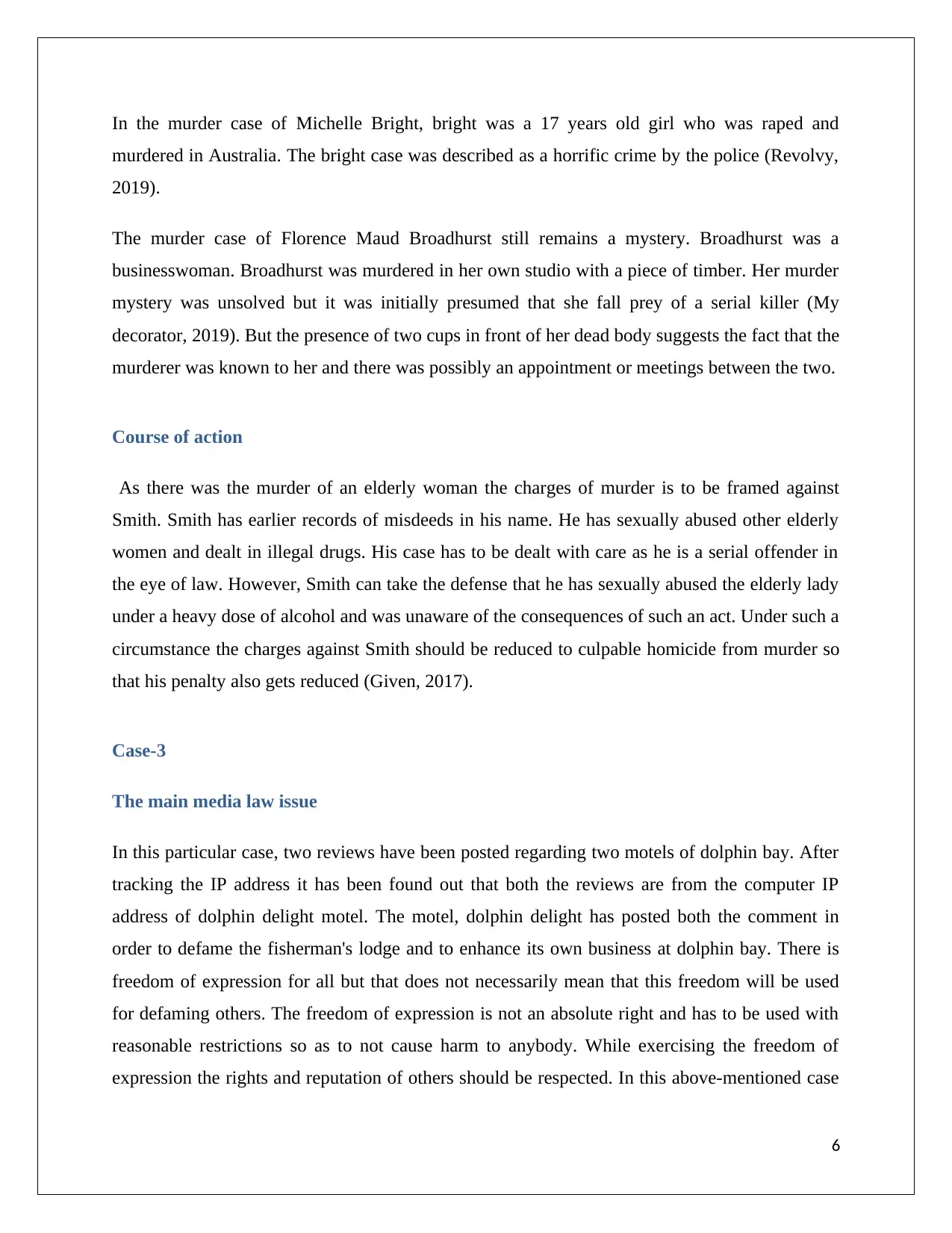
In the murder case of Michelle Bright, bright was a 17 years old girl who was raped and
murdered in Australia. The bright case was described as a horrific crime by the police (Revolvy,
2019).
The murder case of Florence Maud Broadhurst still remains a mystery. Broadhurst was a
businesswoman. Broadhurst was murdered in her own studio with a piece of timber. Her murder
mystery was unsolved but it was initially presumed that she fall prey of a serial killer (My
decorator, 2019). But the presence of two cups in front of her dead body suggests the fact that the
murderer was known to her and there was possibly an appointment or meetings between the two.
Course of action
As there was the murder of an elderly woman the charges of murder is to be framed against
Smith. Smith has earlier records of misdeeds in his name. He has sexually abused other elderly
women and dealt in illegal drugs. His case has to be dealt with care as he is a serial offender in
the eye of law. However, Smith can take the defense that he has sexually abused the elderly lady
under a heavy dose of alcohol and was unaware of the consequences of such an act. Under such a
circumstance the charges against Smith should be reduced to culpable homicide from murder so
that his penalty also gets reduced (Given, 2017).
Case-3
The main media law issue
In this particular case, two reviews have been posted regarding two motels of dolphin bay. After
tracking the IP address it has been found out that both the reviews are from the computer IP
address of dolphin delight motel. The motel, dolphin delight has posted both the comment in
order to defame the fisherman's lodge and to enhance its own business at dolphin bay. There is
freedom of expression for all but that does not necessarily mean that this freedom will be used
for defaming others. The freedom of expression is not an absolute right and has to be used with
reasonable restrictions so as to not cause harm to anybody. While exercising the freedom of
expression the rights and reputation of others should be respected. In this above-mentioned case
6
murdered in Australia. The bright case was described as a horrific crime by the police (Revolvy,
2019).
The murder case of Florence Maud Broadhurst still remains a mystery. Broadhurst was a
businesswoman. Broadhurst was murdered in her own studio with a piece of timber. Her murder
mystery was unsolved but it was initially presumed that she fall prey of a serial killer (My
decorator, 2019). But the presence of two cups in front of her dead body suggests the fact that the
murderer was known to her and there was possibly an appointment or meetings between the two.
Course of action
As there was the murder of an elderly woman the charges of murder is to be framed against
Smith. Smith has earlier records of misdeeds in his name. He has sexually abused other elderly
women and dealt in illegal drugs. His case has to be dealt with care as he is a serial offender in
the eye of law. However, Smith can take the defense that he has sexually abused the elderly lady
under a heavy dose of alcohol and was unaware of the consequences of such an act. Under such a
circumstance the charges against Smith should be reduced to culpable homicide from murder so
that his penalty also gets reduced (Given, 2017).
Case-3
The main media law issue
In this particular case, two reviews have been posted regarding two motels of dolphin bay. After
tracking the IP address it has been found out that both the reviews are from the computer IP
address of dolphin delight motel. The motel, dolphin delight has posted both the comment in
order to defame the fisherman's lodge and to enhance its own business at dolphin bay. There is
freedom of expression for all but that does not necessarily mean that this freedom will be used
for defaming others. The freedom of expression is not an absolute right and has to be used with
reasonable restrictions so as to not cause harm to anybody. While exercising the freedom of
expression the rights and reputation of others should be respected. In this above-mentioned case
6
⊘ This is a preview!⊘
Do you want full access?
Subscribe today to unlock all pages.

Trusted by 1+ million students worldwide
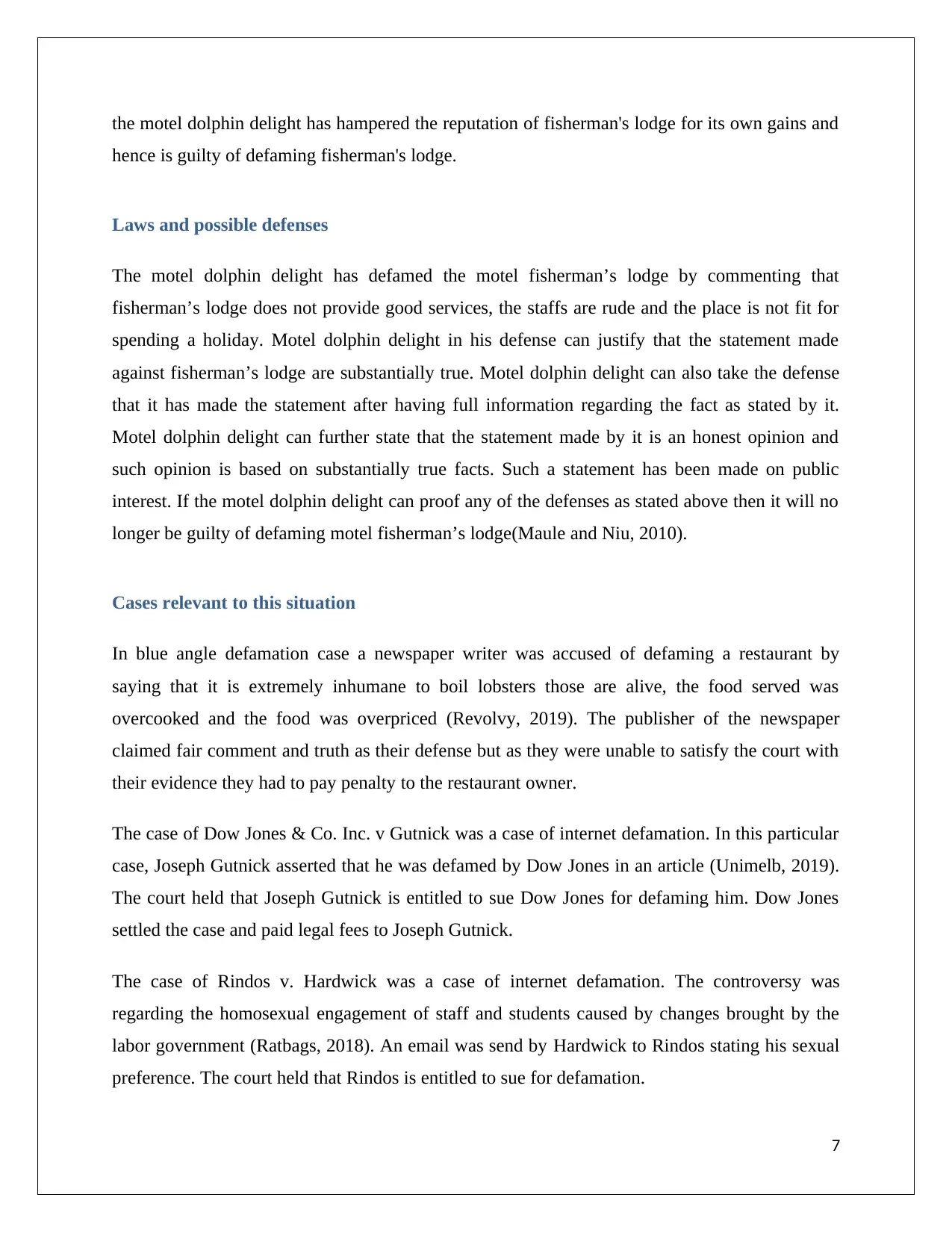
the motel dolphin delight has hampered the reputation of fisherman's lodge for its own gains and
hence is guilty of defaming fisherman's lodge.
Laws and possible defenses
The motel dolphin delight has defamed the motel fisherman’s lodge by commenting that
fisherman’s lodge does not provide good services, the staffs are rude and the place is not fit for
spending a holiday. Motel dolphin delight in his defense can justify that the statement made
against fisherman’s lodge are substantially true. Motel dolphin delight can also take the defense
that it has made the statement after having full information regarding the fact as stated by it.
Motel dolphin delight can further state that the statement made by it is an honest opinion and
such opinion is based on substantially true facts. Such a statement has been made on public
interest. If the motel dolphin delight can proof any of the defenses as stated above then it will no
longer be guilty of defaming motel fisherman’s lodge(Maule and Niu, 2010).
Cases relevant to this situation
In blue angle defamation case a newspaper writer was accused of defaming a restaurant by
saying that it is extremely inhumane to boil lobsters those are alive, the food served was
overcooked and the food was overpriced (Revolvy, 2019). The publisher of the newspaper
claimed fair comment and truth as their defense but as they were unable to satisfy the court with
their evidence they had to pay penalty to the restaurant owner.
The case of Dow Jones & Co. Inc. v Gutnick was a case of internet defamation. In this particular
case, Joseph Gutnick asserted that he was defamed by Dow Jones in an article (Unimelb, 2019).
The court held that Joseph Gutnick is entitled to sue Dow Jones for defaming him. Dow Jones
settled the case and paid legal fees to Joseph Gutnick.
The case of Rindos v. Hardwick was a case of internet defamation. The controversy was
regarding the homosexual engagement of staff and students caused by changes brought by the
labor government (Ratbags, 2018). An email was send by Hardwick to Rindos stating his sexual
preference. The court held that Rindos is entitled to sue for defamation.
7
hence is guilty of defaming fisherman's lodge.
Laws and possible defenses
The motel dolphin delight has defamed the motel fisherman’s lodge by commenting that
fisherman’s lodge does not provide good services, the staffs are rude and the place is not fit for
spending a holiday. Motel dolphin delight in his defense can justify that the statement made
against fisherman’s lodge are substantially true. Motel dolphin delight can also take the defense
that it has made the statement after having full information regarding the fact as stated by it.
Motel dolphin delight can further state that the statement made by it is an honest opinion and
such opinion is based on substantially true facts. Such a statement has been made on public
interest. If the motel dolphin delight can proof any of the defenses as stated above then it will no
longer be guilty of defaming motel fisherman’s lodge(Maule and Niu, 2010).
Cases relevant to this situation
In blue angle defamation case a newspaper writer was accused of defaming a restaurant by
saying that it is extremely inhumane to boil lobsters those are alive, the food served was
overcooked and the food was overpriced (Revolvy, 2019). The publisher of the newspaper
claimed fair comment and truth as their defense but as they were unable to satisfy the court with
their evidence they had to pay penalty to the restaurant owner.
The case of Dow Jones & Co. Inc. v Gutnick was a case of internet defamation. In this particular
case, Joseph Gutnick asserted that he was defamed by Dow Jones in an article (Unimelb, 2019).
The court held that Joseph Gutnick is entitled to sue Dow Jones for defaming him. Dow Jones
settled the case and paid legal fees to Joseph Gutnick.
The case of Rindos v. Hardwick was a case of internet defamation. The controversy was
regarding the homosexual engagement of staff and students caused by changes brought by the
labor government (Ratbags, 2018). An email was send by Hardwick to Rindos stating his sexual
preference. The court held that Rindos is entitled to sue for defamation.
7
Paraphrase This Document
Need a fresh take? Get an instant paraphrase of this document with our AI Paraphraser
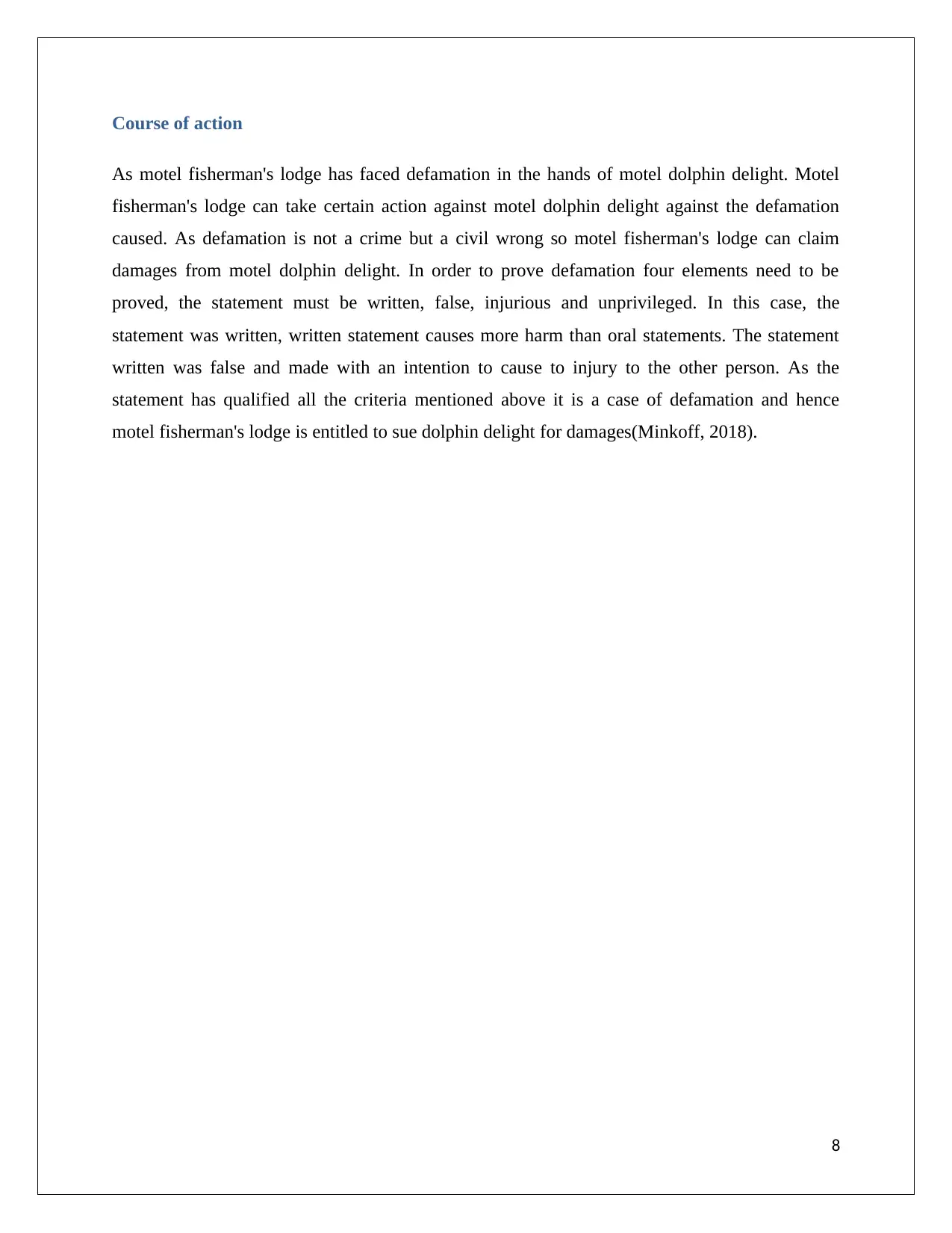
Course of action
As motel fisherman's lodge has faced defamation in the hands of motel dolphin delight. Motel
fisherman's lodge can take certain action against motel dolphin delight against the defamation
caused. As defamation is not a crime but a civil wrong so motel fisherman's lodge can claim
damages from motel dolphin delight. In order to prove defamation four elements need to be
proved, the statement must be written, false, injurious and unprivileged. In this case, the
statement was written, written statement causes more harm than oral statements. The statement
written was false and made with an intention to cause to injury to the other person. As the
statement has qualified all the criteria mentioned above it is a case of defamation and hence
motel fisherman's lodge is entitled to sue dolphin delight for damages(Minkoff, 2018).
8
As motel fisherman's lodge has faced defamation in the hands of motel dolphin delight. Motel
fisherman's lodge can take certain action against motel dolphin delight against the defamation
caused. As defamation is not a crime but a civil wrong so motel fisherman's lodge can claim
damages from motel dolphin delight. In order to prove defamation four elements need to be
proved, the statement must be written, false, injurious and unprivileged. In this case, the
statement was written, written statement causes more harm than oral statements. The statement
written was false and made with an intention to cause to injury to the other person. As the
statement has qualified all the criteria mentioned above it is a case of defamation and hence
motel fisherman's lodge is entitled to sue dolphin delight for damages(Minkoff, 2018).
8
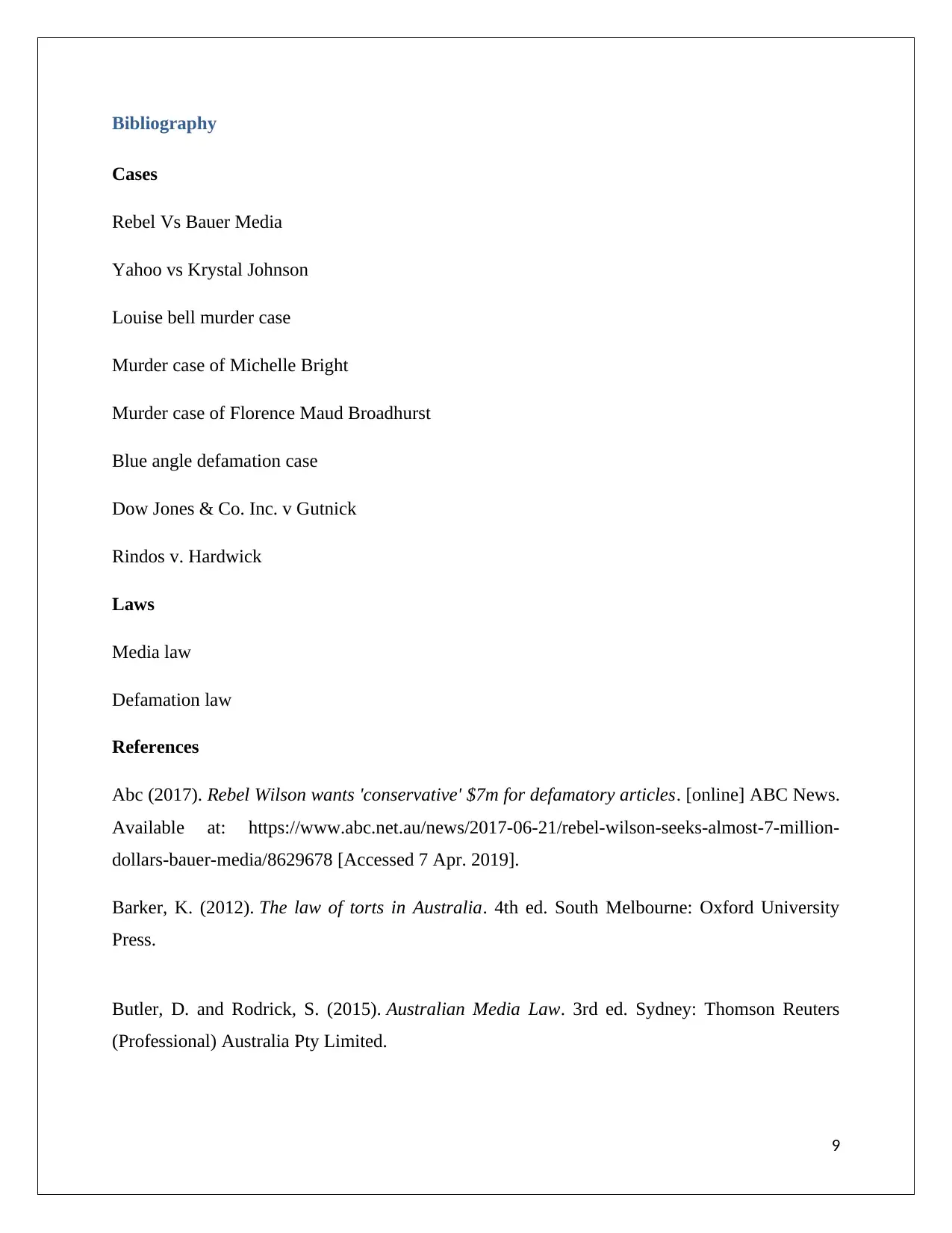
Bibliography
Cases
Rebel Vs Bauer Media
Yahoo vs Krystal Johnson
Louise bell murder case
Murder case of Michelle Bright
Murder case of Florence Maud Broadhurst
Blue angle defamation case
Dow Jones & Co. Inc. v Gutnick
Rindos v. Hardwick
Laws
Media law
Defamation law
References
Abc (2017). Rebel Wilson wants 'conservative' $7m for defamatory articles. [online] ABC News.
Available at: https://www.abc.net.au/news/2017-06-21/rebel-wilson-seeks-almost-7-million-
dollars-bauer-media/8629678 [Accessed 7 Apr. 2019].
Barker, K. (2012). The law of torts in Australia. 4th ed. South Melbourne: Oxford University
Press.
Butler, D. and Rodrick, S. (2015). Australian Media Law. 3rd ed. Sydney: Thomson Reuters
(Professional) Australia Pty Limited.
9
Cases
Rebel Vs Bauer Media
Yahoo vs Krystal Johnson
Louise bell murder case
Murder case of Michelle Bright
Murder case of Florence Maud Broadhurst
Blue angle defamation case
Dow Jones & Co. Inc. v Gutnick
Rindos v. Hardwick
Laws
Media law
Defamation law
References
Abc (2017). Rebel Wilson wants 'conservative' $7m for defamatory articles. [online] ABC News.
Available at: https://www.abc.net.au/news/2017-06-21/rebel-wilson-seeks-almost-7-million-
dollars-bauer-media/8629678 [Accessed 7 Apr. 2019].
Barker, K. (2012). The law of torts in Australia. 4th ed. South Melbourne: Oxford University
Press.
Butler, D. and Rodrick, S. (2015). Australian Media Law. 3rd ed. Sydney: Thomson Reuters
(Professional) Australia Pty Limited.
9
⊘ This is a preview!⊘
Do you want full access?
Subscribe today to unlock all pages.

Trusted by 1+ million students worldwide
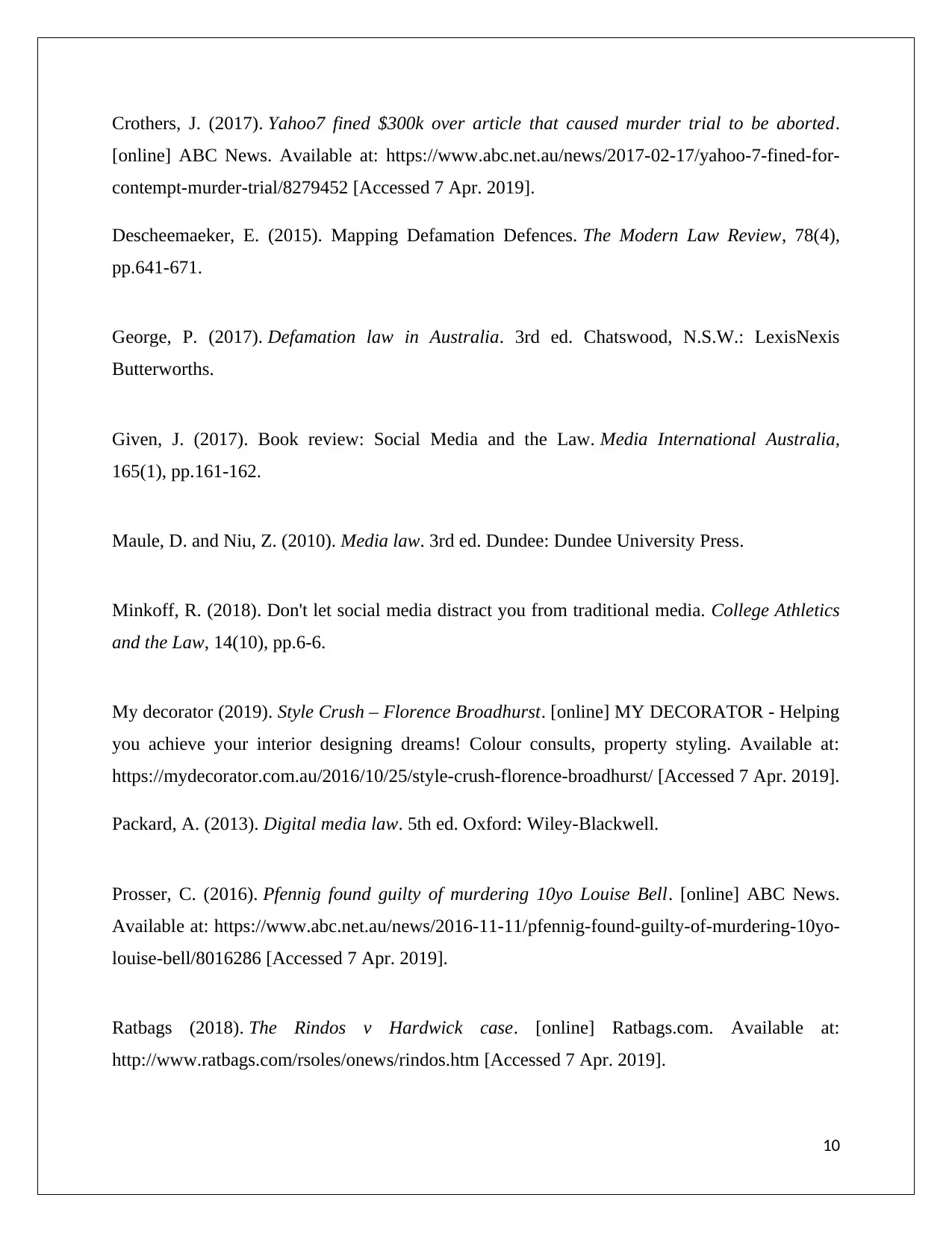
Crothers, J. (2017). Yahoo7 fined $300k over article that caused murder trial to be aborted.
[online] ABC News. Available at: https://www.abc.net.au/news/2017-02-17/yahoo-7-fined-for-
contempt-murder-trial/8279452 [Accessed 7 Apr. 2019].
Descheemaeker, E. (2015). Mapping Defamation Defences. The Modern Law Review, 78(4),
pp.641-671.
George, P. (2017). Defamation law in Australia. 3rd ed. Chatswood, N.S.W.: LexisNexis
Butterworths.
Given, J. (2017). Book review: Social Media and the Law. Media International Australia,
165(1), pp.161-162.
Maule, D. and Niu, Z. (2010). Media law. 3rd ed. Dundee: Dundee University Press.
Minkoff, R. (2018). Don't let social media distract you from traditional media. College Athletics
and the Law, 14(10), pp.6-6.
My decorator (2019). Style Crush – Florence Broadhurst. [online] MY DECORATOR - Helping
you achieve your interior designing dreams! Colour consults, property styling. Available at:
https://mydecorator.com.au/2016/10/25/style-crush-florence-broadhurst/ [Accessed 7 Apr. 2019].
Packard, A. (2013). Digital media law. 5th ed. Oxford: Wiley-Blackwell.
Prosser, C. (2016). Pfennig found guilty of murdering 10yo Louise Bell. [online] ABC News.
Available at: https://www.abc.net.au/news/2016-11-11/pfennig-found-guilty-of-murdering-10yo-
louise-bell/8016286 [Accessed 7 Apr. 2019].
Ratbags (2018). The Rindos v Hardwick case. [online] Ratbags.com. Available at:
http://www.ratbags.com/rsoles/onews/rindos.htm [Accessed 7 Apr. 2019].
10
[online] ABC News. Available at: https://www.abc.net.au/news/2017-02-17/yahoo-7-fined-for-
contempt-murder-trial/8279452 [Accessed 7 Apr. 2019].
Descheemaeker, E. (2015). Mapping Defamation Defences. The Modern Law Review, 78(4),
pp.641-671.
George, P. (2017). Defamation law in Australia. 3rd ed. Chatswood, N.S.W.: LexisNexis
Butterworths.
Given, J. (2017). Book review: Social Media and the Law. Media International Australia,
165(1), pp.161-162.
Maule, D. and Niu, Z. (2010). Media law. 3rd ed. Dundee: Dundee University Press.
Minkoff, R. (2018). Don't let social media distract you from traditional media. College Athletics
and the Law, 14(10), pp.6-6.
My decorator (2019). Style Crush – Florence Broadhurst. [online] MY DECORATOR - Helping
you achieve your interior designing dreams! Colour consults, property styling. Available at:
https://mydecorator.com.au/2016/10/25/style-crush-florence-broadhurst/ [Accessed 7 Apr. 2019].
Packard, A. (2013). Digital media law. 5th ed. Oxford: Wiley-Blackwell.
Prosser, C. (2016). Pfennig found guilty of murdering 10yo Louise Bell. [online] ABC News.
Available at: https://www.abc.net.au/news/2016-11-11/pfennig-found-guilty-of-murdering-10yo-
louise-bell/8016286 [Accessed 7 Apr. 2019].
Ratbags (2018). The Rindos v Hardwick case. [online] Ratbags.com. Available at:
http://www.ratbags.com/rsoles/onews/rindos.htm [Accessed 7 Apr. 2019].
10
Paraphrase This Document
Need a fresh take? Get an instant paraphrase of this document with our AI Paraphraser
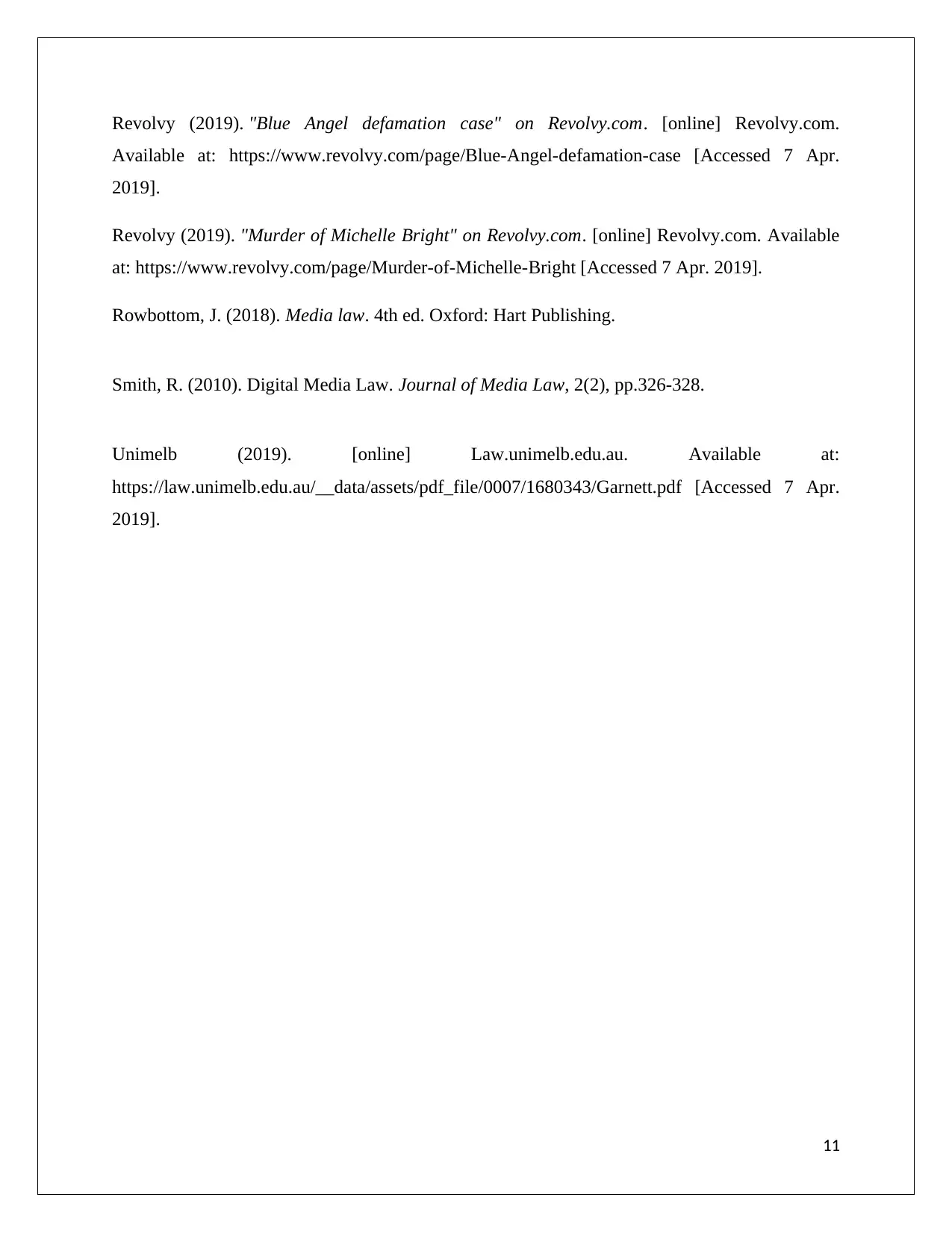
Revolvy (2019). "Blue Angel defamation case" on Revolvy.com. [online] Revolvy.com.
Available at: https://www.revolvy.com/page/Blue-Angel-defamation-case [Accessed 7 Apr.
2019].
Revolvy (2019). "Murder of Michelle Bright" on Revolvy.com. [online] Revolvy.com. Available
at: https://www.revolvy.com/page/Murder-of-Michelle-Bright [Accessed 7 Apr. 2019].
Rowbottom, J. (2018). Media law. 4th ed. Oxford: Hart Publishing.
Smith, R. (2010). Digital Media Law. Journal of Media Law, 2(2), pp.326-328.
Unimelb (2019). [online] Law.unimelb.edu.au. Available at:
https://law.unimelb.edu.au/__data/assets/pdf_file/0007/1680343/Garnett.pdf [Accessed 7 Apr.
2019].
11
Available at: https://www.revolvy.com/page/Blue-Angel-defamation-case [Accessed 7 Apr.
2019].
Revolvy (2019). "Murder of Michelle Bright" on Revolvy.com. [online] Revolvy.com. Available
at: https://www.revolvy.com/page/Murder-of-Michelle-Bright [Accessed 7 Apr. 2019].
Rowbottom, J. (2018). Media law. 4th ed. Oxford: Hart Publishing.
Smith, R. (2010). Digital Media Law. Journal of Media Law, 2(2), pp.326-328.
Unimelb (2019). [online] Law.unimelb.edu.au. Available at:
https://law.unimelb.edu.au/__data/assets/pdf_file/0007/1680343/Garnett.pdf [Accessed 7 Apr.
2019].
11
1 out of 11
Related Documents
Your All-in-One AI-Powered Toolkit for Academic Success.
+13062052269
info@desklib.com
Available 24*7 on WhatsApp / Email
![[object Object]](/_next/static/media/star-bottom.7253800d.svg)
Unlock your academic potential
Copyright © 2020–2026 A2Z Services. All Rights Reserved. Developed and managed by ZUCOL.




